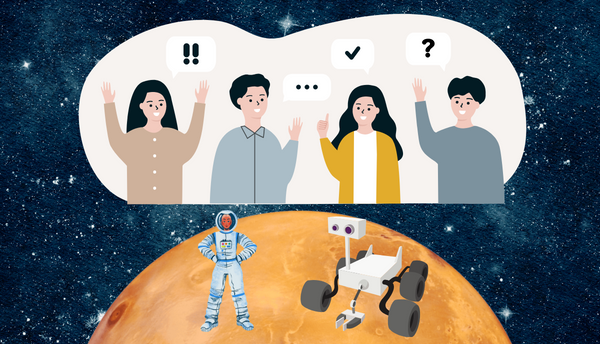Scientists are always discussing and debating their ideas. One topic that is continually up for debate is ‘Should humans explore space?’. Some people think it is important for people to visit other worlds. Others think that there is no need to send humans when robots can do the job.
What do you think? Will others agree with you? Hold a debate to find out!
By the end of this activity you will:
- have formed your own opinions
- have discussed ideas as a team
- have created a persuasive argument
- have listed to the ideas of others
To complete this activity you will need:
- a group of people to debate with
- some paper and pens to make notes

Approx Duration
30 - 60 mins
Have a go!
What is a debate?
Everyone shares their experience of debates and their ideas of why it can be useful to discuss ideas and persuade others.
Warm-up activity
- Find a partner
- Imagine you are going to space. In your pair, each decides on something to take with you.
- Imagine you are in a rocket, hurtling through space when you realise you don’t have enough fuel. You must eject some supplies from the rocket to reduce your weight. In your pair, decide which of the 2 items you will save and why.
- Pairs share their decisions with the rest of the group.
Debate activity
- The topic for debate is “Space should be explored by humans, not robots”. Make sure everyone knows what the topic is.
- Allocate four areas of the room (you can put signs up on the wall if you are having trouble remembering) as:
- ‘Only humans should explore space’
- ‘Only robots should explore space’
- ‘Both humans and robots should explore space’
- ‘It is not worth exploring space’
- Everyone thinks and decides which of the 4 statements they agree most with. They move to that area of the room.
- Each of the 4 teams spends time discussing why they chose that position and how they could persuade others to join their team. Teams should note down their main ideas.
- Each team nominates someone to briefly, but persuasively state their case.
- The debate begins! You can ask questions, back up your case, or even change teams if someone manages to change your mind. But be respectful of others and attentive when they are talking.
- See if the whole group can come to a consensus. What are the pros and cons? Is one of the 4 statements a clear winner?
If you liked this, why not try
